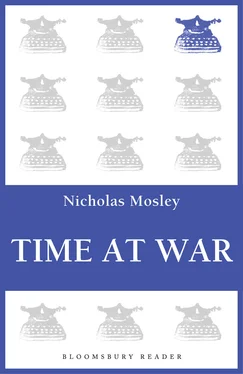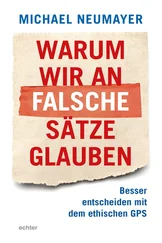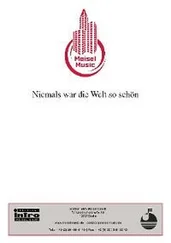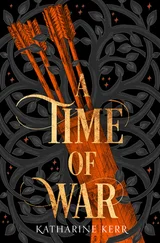There remained the question of what we would find outside in the morning. There had been a lot of distant firing and explosions and tracers from the hills during the night: presumably the large-scale attack on Spaduro had gone in, but to what effect we could not tell. If it had failed we would be under exposed siege for another whole day. Desmond had set about building up protective rubble in the doors and windows. I seemed to be both too tired and too triumphant to care. Whatever had been attempted, or destined, or hoped for, had come off; and I did not think anything else could really fail.
At first light we were standing-to and looking out into the cold mist like people in a Western film wondering if they would see Red Indians or the cavalry. There were figures moving on the further hills: surely they were acting too openly to be enemy? We risked a small cheer. After a while it seemed safe to step out of the front of the house into the space where only a few hours ago there had been such danger: there were some bodies of Germans lying about, one of them blocking the opening into the dugout on the right. We pulled this clear; there was still no sight or sound of anyone inside. I called in my best German again for people to come out; and then, to our surprise, there emerged, one by one like wasps from a hole, twelve men, about half of them wounded. We had not expected so many.
We sent them back under escort. The second-in-command of our company came up to take over arrangements for further defence; our battalion commander came up to congratulate us, and said that the night attack on Spaduro had been a success, thanks in large part to the success on our attack on Spinello. We hung about for the rest of the day while the situation in the hills became clearer. We were told to dig trenches outside the farmhouse in case the shelling started again, but no one paid much attention. In the evening we set about marching back — not just to our previous positions but to somewhere near Castel del Rio where we could rest. But this was a long march, and I and others were suffering both from exhaustion and a reaction of extreme other-worldliness. During a ten-minute rest on the march an officer who had not been in the battle came along the line and told us to get up and get a move on. I remember telling him to fuck off.
I wrote a long account of this battle to be sent some time later to my sister and it is from this, as well as memory, that I have taken many of the details of this account. I ended my letter by saying — ‘I find it hard to believe it was I that did all those peculiar things!’ and then, as if in an attempt at explanation — ‘I have yet to meet a man who fought well because he believes in the cause for which he is fighting … it is always pride that incites and succeeds in war.’
The war in Europe lasted seven more months. I did not get home for almost another year. After the battle of Casa Spinello war became a matter of sticking it out, not something of which the outcome was in much doubt. Spaduro had been taken, but we still did not get through to the plain that autumn. There was too much rain; our forces were too depleted. For myself, I had done what I had wanted to do at Spinello — or what had been required, or destined. Now I wanted to get home. Pride may be required if a human feels he has to perform some task; after that it makes sense no longer.
The battalion stayed in the northern hills until well into the new year. There were more waterlogged trenches, more farmyards with rotting cattle, but no more attacks that winter. Daily existence became largely a matter of chores — weapons testing and inspection, the digging of latrines, the official inspection of feet (foot-rot had become a prevalent but preventable disease). Every so often we went down for a few days’ rest to tents in the valley. I huddled under blankets and tried to read.
The canister of books I had brought with me from England had got lost somewhere on my travels in the summer; then it turned up as if miraculously on my return from Egypt. I came across an officer whom I did not know reading, of all things, a book by Richard Jefferies. I asked him how he had come across it. He said that a strange box had turned up in his luggage that looked as if it should contain ammunition, but then … well, he was extraordinarily grateful to me because he had been enjoying stuff that he would otherwise not have read; but of course I must have the canister back.
But now, in the mountains in the rain, I had run out of books — and anyway I did not know what I wanted to read. The world seemed so mad: did art, literature, make it any better? However, somewhere on our journey to the north we had stayed near a recently liberated prisoner-of-war camp which had a Red Cross library of English books, and we had been told we could pick out and keep any we liked. I had chosen a book by William Faulkner, of whom I had not heard, but it had an introduction by Richard Hughes, whom I admired. So I now read The Sound and the Fury in a bivouac tent in the pouring rain; conditions were too wet almost literally to put it down. The first third of the story is told by a mentally defective youth who hardly tries to make sense of the world around him; sense has to be looked for, hoped for, by the reader. After these are flashbacks, narrations by other members of the family, in the course of which there are glimpses of things becoming clearer. Then, about two thirds of the way through, the whole import of the story, its structure and meaning, burst upon the reader in a flash. I had never come across anything like this before. I thought — Yes this is how life may be understood, if at all; this is the way in which I want to write novels after the war.
Mervyn had been carried off to hospital after Spinello. I had a letter from him from Arezzo –
Dear Nick, I have been thinking a great deal about you lately, which goes without saying. I was so glad to see Mann the signaller chap who said you were safe enough and coming out of the line for a bit. I hope it is for a long time. This letter is really to get you to write some account of what happened after I left. I will not hold forth in a long and boring screed myself because I cannot write very well my left arm being in a sling. I am well enough and I suppose will be in bed for about a fortnight. Your performance at Casa Spinello was great. I told the CO and the rough draft of a recommendation I sent from the hospital is with this letter. I was very fed up with myself at the Casa. I reckon myself pretty good in battle, but my performance there was the worst ever. It was certainly your greatest ever but anyway we had better not begin such a discussion by post. Pray write. Love to Fitz, Desmond and Co. Yours, Mervyn.
It had not seemed to anyone else that Mervyn’s performance at Spinello had not been great. He too had been put up for an award, as had Desmond; and Corporals Tomkinson and McClarnon on my recommendation. Because the battle of Spinello had been such an important one for the whole division, it had been watched by the brigadier and the 78th Division general through binoculars from a vantage point on a distant hill. So its fame had spread.
We were not out of the line for as long as Mervyn had hoped; then there were night patrols again — and these were not always now an uneventful game. There was one position where we were separated from the Germans by a shallow valley along which a road ran between us and them; halfway along this road there was a bridge over a small river. It was not feasible for either us or the Germans to occupy this bridge during the day, but for some military reason it was considered crucial by both sides to be in possession of it at night. So every evening at dusk there was a race to see who would get to the bridge first: if we started too early we got shot up by the Germans in the light; if we started too late we got shot up in the dark by Germans who had got there first. At regular intervals it came to be the turn of my platoon to do this race. This was the sort of nerve-racking routine that made people break down during this long and wearying winter. There were, in fact, one or two officers who said they could not go on. This was understood by higher authority; they were not persecuted as they would have been in the First World War; they were sent back to jobs at the base. Any fear of this leading to a spate of such occurrences did not materialise. If one had not had pride, one would not have been in the front line anyway.
Читать дальше












